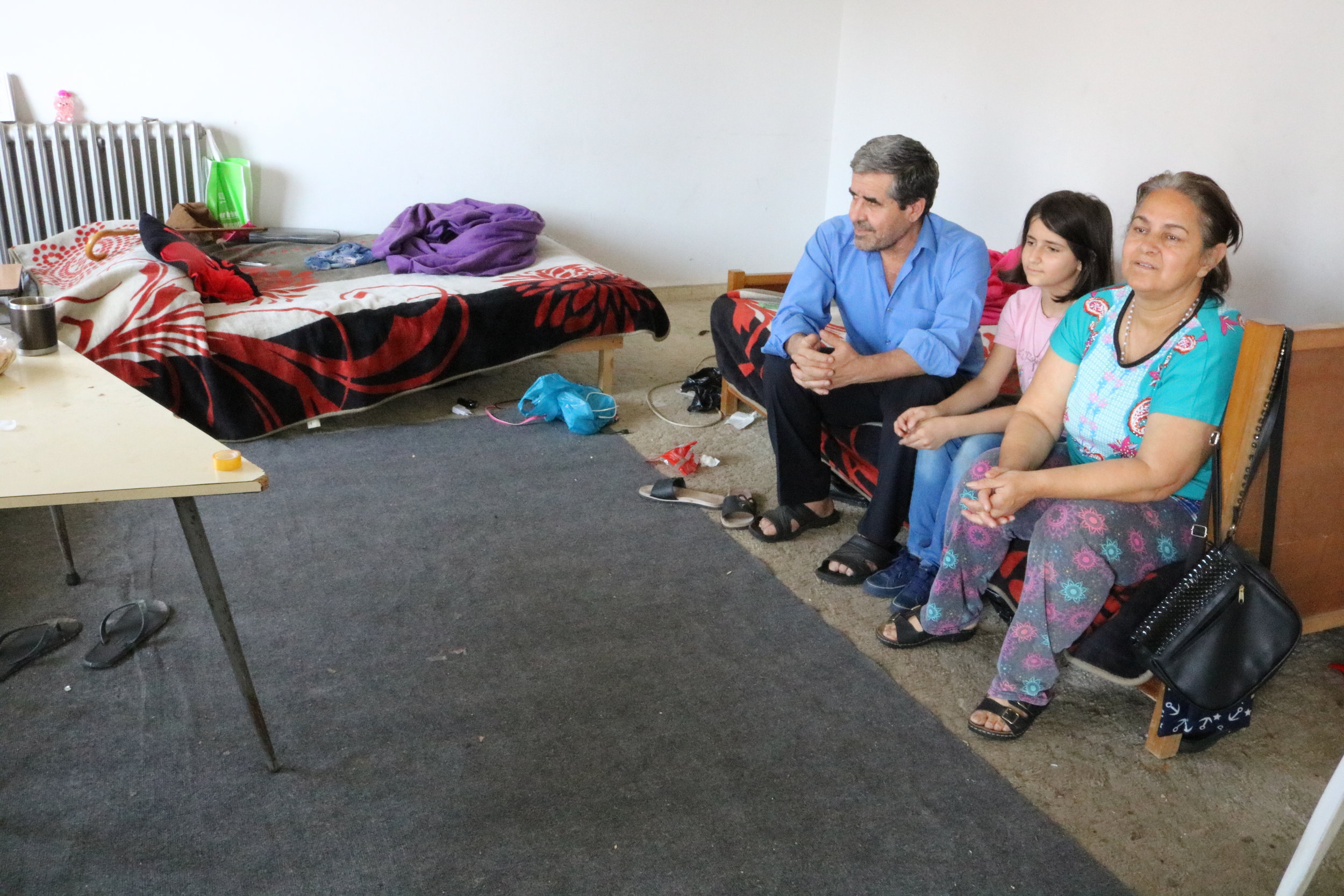Nada sat in her sweltering hot, one-room home in Lebanon, grazing her fingers over a bullet wound on her right forearm. It’s a reminder of the moment ISIS kidnapped her daughter.
The scar on Nada’s right forearm is a reminder of the day ISIS shot her while she tried to rip her 15-year-old daughter away from the terrorists.
She tried to rip the 15-year-old away from the terrorists, so they shot her. It was 2014, and the Islamic State Group had just invaded Mosul, Iraq. Thousands of Christians fled to a safe house outside the city -- including Nada's family. But the terrorists found them, stormed in and opened fire.
Nada's husband ran after the captors, but neither he nor his daughter were ever seen again.
“ISIS either kills their victims, rapes them or sells them,” Nada said. “But I feel my husband and daughter are alive. I pray nothing happened to them so we can one day be together."
Nada wants to go looking for them, but she can’t. Although Iraq drove ISIS out of Mosul in July, it’s still not safe. The Old City is a pile of rubble, following a nine-month battle that has been called the worst urban warfare since World War II. Nearly 10,000 buildings were destroyed. Basic needs, like water, electricity and medical care, are sparse. And the city is covered in mines and debris that the United Nations says could take a decade to clear.
“A family might be able to return home, but maybe their toaster oven is booby trapped and will explode,” said Wendy Taeuber, International Rescue Committee’s Iraq Country Director. “You have no idea if something might have been planted. It's going to take a long, long time to be able to confidently say any given area in the heart of the old city is safe.”
For now, more than 18,000 Iraqis are stuck in Lebanon — the last place you’d want to be as a refugee. The third-world country is already hosting about 1.5 million Syrians, who have fled the most catastrophic event in modern history. So headlines and international aid tend to flood toward them.
And in the media — Iraqis are often overlooked.
That’s not to say Syrians get all the help they need. In fact, the United Nations High Commissioner for Refugees (UNHCR) is struggling to give them all food, heat and money.
But Iraqis are struggling, too. Like Syrians, they’re sending their kids to work; living with diseases because they can’t afford medical costs; and feeling hopeless as developed countries deny them visas.
Below are stories of three Iraqi families I met in Lebanon:
NADA'S FAMILY
Fadi (left) and Farah (right) work at a cafe in northern Lebanon. Their boss, Samir (middle), hired them to get the boys to talk again. They've been quiet since witnessing ISIS kidnap their sister and shoot their mother.
Nada’s sons, Fadi (14) and Farah (12) , work at a cafe in northern Lebanon.
One day, I walked in and saw them washing dishes behind the counter. When I said hi, they quickly looked down. It turns out they’ve barely spoken to — or made eye contact with— anyone since witnessing ISIS kidnap their sister, shoot their mom and take their father.
When Nada and her boys fled to Lebanon, a priest gave them a small home to live in.
The priest asked the owner of the cafe to hire the boys. He thought that’d get them to talk again.
Farah and Fadi also needed the money. Nada registered with the UN, and receives cash assistance — about $170 a month — but not consistently.
In July, I wrote about how Syrian refugee children don’t have the chance to process, or heal from, the psychological wounds they suffered in their home country due to child labor.
But what we haven’t seen in headlines is that Iraqis — who struggle to find work in Lebanon’s dismal economy — also feel forced to send their kids to work when they don’t receive aid.
THE JINDOU FAMILY
Saman Jindou (far right) shows me a photo of his family’s four-story villa in Iraq. That was before ISIS stole everything from inside and burnt it to coal.
Fast forward four years, the 21-year-old now shares a tiny apartment in Zgharta with eight relatives.
He and his 16-year-old brother (not pictured) are the breadwinners. They dropped out of school to work at a cement factory seven days a week, up to 12 hours a day, for 15 dollars a day.
Because they work, they’re not eligible for cash assistance from the United Nations High Commissioner for Refugees (UNHCR).
“I feel like Iraqis are not getting enough,” Jindou said. “We’re all refugees. We’re all the same.”
UNHCR says because of the overwhelming number of refugees pouring into Lebanon, it has to target those who are most vulnerable. Refugees from Syria, many of whom left their home with nothing and now live in makeshift camps and tents, set the bar high for what's considered vulnerable.
FAMILIES GETTING MONTHLY CASH ASSISTANCE FROM UNHCR
THE HINDOU FAMILY
11-year-old Sidra Hindou (middle) hasn’t stepped in a classroom in two years.
Her family, now in Lebanon, doesn’t qualify for cash assistance from UNHCR.
Sidra’s father, Samir, is partly blind -- so he can’t work.
When they moved to Lebanon, he enrolled Sidra in school for just two months. But when he couldn’t afford book and transportation costs, he pulled her out.
“If we get accepted into Australia, I hope she will go back to school,” Hindou said.
But the odds of his family getting accepted are slim.
Because of the Syrian crisis, Iraqis have a long-shot at making it out of the Middle East
Refugees themselves cannot apply for resettlement through UNHCR. Instead, they register with the UN and are referred to leave the country only if they fit the criteria — based on who is most vulnerable
“We’re working against limited resettlement quotas and the decision ultimately falls with a country,” said Dana Sleiman, a spokesperson with UNHCR. “When we break the unfortunate news to a refugee family that resettlement is not an option for them, it shatters their entire existence. Because it means their stuck.”





